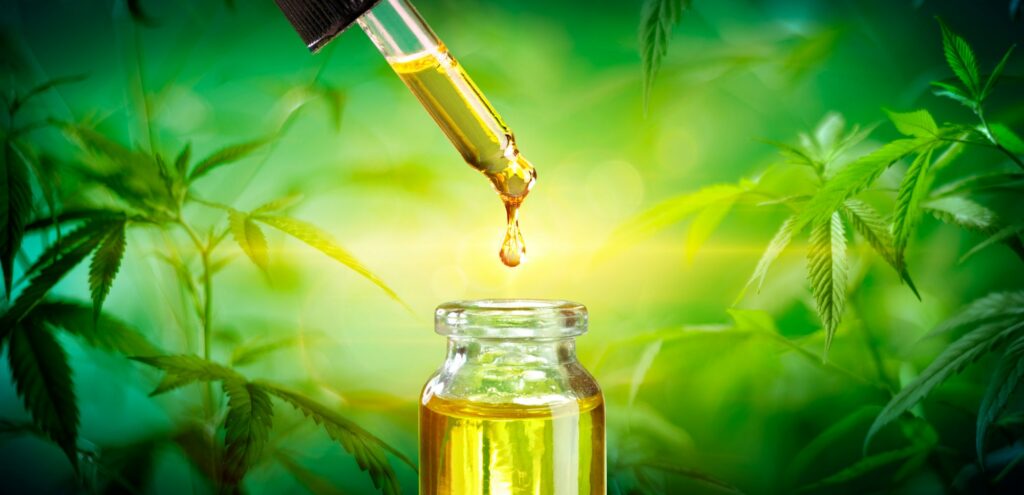Hemp extract, hemp seed oil, CBD oil, CBG oil—at times, the legal hemp industry can seem like a minefield of names, labels, and abbreviations.
All these products begin with the cannabis plant, but their final composition, as well as their legal status and recreational value, can differ considerably.
So, what’s the difference between hemp extract and hemp seed oil, and where does CBD oil fit into all of this?
What Is Hemp Extract?
The term “hemp extract” is pretty broad and covers all extracts from the hemp plant.
An extract can come from the flowers, stalks, and leaves of the Cannabis sativa plant and typically contains a wide range of natural compounds, including fatty acids, terpenes, cannabinoids, flavonoids, and vitamins.
If oil is extracted from the flowers of a high-CBD strain, it can produce a premium full-spectrum CBD oil. These products are typically marketed for their CBD content, but the fact that they include other cannabinoids and terpenes means they could provide something known as the “entourage effect”.
Simply put, the entourage effect is the combined effects of multiple compounds.
Cannabinoids and terpenes complement each other and research suggests consumers may experience an accumulative response when combining multiple aspects of the plant than when they do when used individually.
What Does Hemp Extract Oil Do?
Consumers may experience a variety of positive reactions to hemp extracts, but it depends on the quality of the extract and the compounds that it contains.
It also depends on how the term “hemp extract oil” is being used, as there is no strict definition.
Technically, CBD oil is a hemp extract and it’s one that may grant relief and recovery, support rest and everyday stress, along with other benefits. At the same time, however, the term “hemp extract” is used by skincare brands that add small amounts of hemp to creams and soaps.
If you’re buying something that is labeled as a “hemp extract”, check what it contains, where it comes from, and whether you’re buying a premium high-CBD oil extract or something that contains a few meager ground leaves.
What is the Nutritional Composition of Hemp Seed Oil?
The nutritional content of hemp oil can vary based on the quality of the seeds/product and the method of extraction. A typical hemp seed oil product contains about 60 calories per tablespoon, as well as 4 grams of fat and just 0.3 grams of saturated fat.
It also contains several grams of protein and nutrients such as magnesium, vitamin C, iron, calcium, and several B vitamins.
Most of the vitamins and minerals are negligible and few would call hemp oil a “superfood”. However, the fact that it’s rich in polyunsaturated fats and low in saturated fat could provide a welcome boost of healthy fats.
What is Hemp Seed Oil?
Hemp seed oil is also known as hemp seed extract. This is one of the reasons it’s often confused with hemp extract. However, hemp seed oil does not contain CBD, THC or other cannabinoids, terpenes and flavonoids.
Hemp seed oil is sold as a liquid and in liquid capsules. It can be added to food, taken as a supplement, or even applied to the skin. It may provide many of the same benefits as olive oil and works in similar ways.
What is Hemp Seed Oil Used For?
Hemp seed oil is extracted from hemp seeds. Also known as hemp oil, it’s packed with fatty acids and these may help to support overall health and wellbeing when used as part of a balanced diet.
The three main fatty acids in hemp oil are alpha-linolenic acid, gamma-linolenic acid, and linoleic. Consumption of these polyunsaturated acids has been linked with lower levels of cholesterol and improved cardiovascular health.
According to the American Heart Association, most of the fats you eat should be polyunsaturated or monounsaturated. Hemp seed oil, in addition to olive oil and sunflower oil, is a great way to get your daily fix.
Many of the best sources of essential fatty acids are animal-based, so hemp oils are a great alternative for anyone following a strict vegan or vegetarian diet.
What Is Better, Hemp Oil Or Hemp Extract?
Hemp extract and hemp seed oil are two very different products and there is no “better” option.
It really all depends on what you’re looking for.
If you want a product that can unlock the full potential of the hemp plant, one that contains cannabinoids, terpenes, and flavonoids, pick up a full-spectrum CBD oil.
CBD oil is a type of hemp extract that contains a high concentration of cannabidiol (CBD) in combination with other natural hemp compounds.
It can be used orally and topically and there are even CBD oils for your pets.
CBD oils are some of the most sought-after products in the US right now and their popularity has exploded since CBD was legalized at a federal level back in 2018.
If you’re looking for a food product that can add some essential fatty acids, protein, and other nutrients to your diet, hemp seed oil might be the better option.
Summary: Hemp Extracts vs Hemp Seed Oil
Although hemp seed oil and hemp extracts both come from the same plant, they are very different terms and are used to describe very different products.
Hemp seed oil is extracted from hemp seeds and is primarily used for its nutritional benefits. It is rich in fatty acids and contains a host of vitamins and minerals.
Hemp extract, however, is a definition that covers extracts procured from the flowers, stalks, and leaves of the plant. It’s something that you can find in everything from health and skincare products to premium CBD oil.

